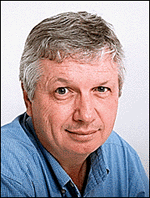


![]()
Talk Story
E.B. White of the New Yorker once said, "Democracy is the recurrent suspicion that more than half of the people are right more than half of the time." If you're among the suspicious, there's an exercise to convince work groups that teams solve problems better than individuals called "Survivor on the Moon." Opportunity beckons in
the Sept. 11 aftermathParticipants imagine they've crashed and must travel on foot 300 kilometers across the lunar surface to safety. Each gets a list of 15 items that survived the crash, ranging from an inflatable life raft and a box of matches to oxygen tanks and pistols.
Team members rank the usefulness of each item from 1 to 15, first as individuals and then as groups. When the two sets of answers are compared to rankings done by NASA engineers, the team's answers are usually better -- but not always -- than any individual's.
A workshop last Saturday at Bishop Museum reminded me of that exercise. Its purpose was to discuss how to change Hawaii -- its institutions, economy and communities -- for the better.
Almost 90 citizens showed up, a broad cross-section of folks from government, academia, business, media, non-profit agencies and the arts, reflecting a widely felt need to respond to Hawaii's economic crisis since the Sept. 11 attacks.
Breaking up into self-selected groups, participants talked about whatever anybody wanted to discuss. Topics included:
>> Bringing rescue workers and families of terrorism victims to Hawaii.I joined a group concerned with developing Hawaii's social capital, which one person defined as our quality of life.>> Getting candidates to commit to economic growth programs.
>> Reducing Hawaii's dependence on mainland food and other goods.
>> Avoiding building new prisons by reducing recidivism.
>> Increasing the number of locally owned businesses.
>> Making art and culture a driver of our economy.
>> Getting education, businesses and non-profits working closer together.
>> Developing alternative energy technology to use and export.
>> Measuring progress with a quality of life index rather than gross state product.
>> Getting the whole community involved, perhaps through the Internet.
>> Working toward Native Hawaiian justice and sovereignty.
>> Finding ways for Hawaii to grow its own entrepreneurs.
To be "good soldiers for democracy," said one group member, we need to do more than just buy a car or take a trip. Consumption is not the only answer.
We need to find other ways to use this opportunity to come together and profit from a renewed spirit of togetherness.
Hawaii must get back to its core values and rebuild the Aloha spirit, making more time for others, another person said. "We used to take better care of each other. When we gave someone a break in traffic, we used to assume our kindness would be reciprocated within the next couple of blocks. Life has become less comfortable, relaxed and tolerant."
"We know the prices of things, but not their value," another agreed. Locally owned businesses give back to the community, but we increasingly patronize big-box retailers who don't.
"We teach our children how to be entertained, not how to learn," said someone. "Our kids saw the Sept. 11 attacks on TV and thought it was entertainment. Our society has become based on entertainment and shopping."
We've allowed tourism to become the single dominant business here through apathy, he continued. "We're not paying attention -- if we did, we'd do something about it."
Another member suggested we keep the conversation on a human scale. He, too, quoted E.B. White: "I arise in the morning torn between a desire to save the world and a desire to savor the world. This makes it hard to plan the day."
Sept. 11 has clearly created many opportunities for people to escape apathy and try to get something done.
A member reminded our group what Derek Davies, the former editor of the Far Eastern Economic Review, once said: "Hawaii has never missed an opportunity to miss an opportunity."
We all have a stake in working together to make sure that we don't miss this one.
John Flanagan is the Star-Bulletin's contributing editor.
He can be reached at: jflanagan@starbulletin.com.